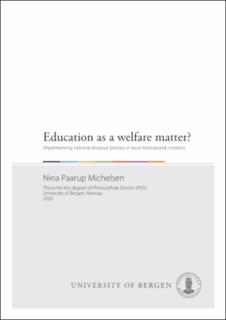Education as a welfare matter? : Implementing national dropout policies in local institutional contexts
Doctoral thesis
Permanent lenke
https://hdl.handle.net/1956/24458Utgivelsesdato
2020-11-13Metadata
Vis full innførselSamlinger
- Department of Government [457]
Sammendrag
The overall focus of this thesis is the implementation of national policies at the intersection between welfare and education. My aim has been to further the connection between the field of education and welfare. A political issue incorporating both welfare and education is school dropout. The term dropout gained momentum when the right to upper secondary school was legislated in Norway in 1994, thus increasing the number of young people in upper secondary education. In line with Arnesen and Lundahl (2006), I see education as an integral part of the welfare state, as a means of inclusion and an investment in people and in the welfare state. This thesis relies on data from qualitative semistructured interviews and policy documents. As an overall analytical framework for the three articles, I have used the integrated implementation model (Winter 2012: 229); the model includes a set of three main categories of variables: policy formulation, implementation process and implementation results, so the model as a whole focuses on the relationship between these three sets of variables. Accordingly, this framework served as my research design. For article 1, I wanted to study policy formulation, or how certain policies are put on the agenda. In article 2, my focus was on the organisational and interorganisational practices surrounding the implementation of a policy, while in article 3, I wanted to pursue street-level bureaucratic behaviour in schools.
As a theoretical framework, I argue in favour of combining two different theoretical points of departure that were constructed to examine the implementation of national policies at the intersection of welfare and education in local contexts. Examining the meso level, I relied on historical institutionalist theory, especially the works of Steinmo et al. (1992), Thelen (2003), Streeck and Thelen (2005) and Mahoney and Thelen (2010), along with the general assumption that institutions and social regimes change in certain ways over time. As such, at the micro level, I relied on Lipsky’s (1980) theory of street-level bureaucrats, with March and Olsen’s (1998) concept of logics of appropriateness and logic of consequences. The two theories assisted my depiction of what happens when policies are encountered at the local level because both theories are grounded on the basic assumptions concerning how actors and individuals will act within a given institutional context.
Består av
Paper I: Michelsen, Nina Paarup. Looking through the policy window: How PISA temporarily changed the institutional structures in Norway. Full text not available in BORA.Paper II: Michelsen, Nina Paarup and Homme, Anne. Implementing cross-sectoral policies: The importance of institutional context. Full text not available in BORA.
Paper III: Michelsen, Nina Paarup. Lærerrollen i Krysspress: Nye yrkesgrupper i møte med skolen som organisasjon. Nordiske Organisasjonsstudier (Nordic Organization Studies). Nr.1 2019. The article is available in the main thesis.
